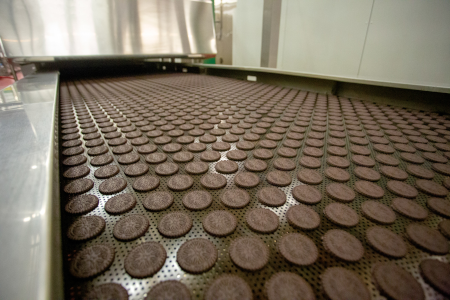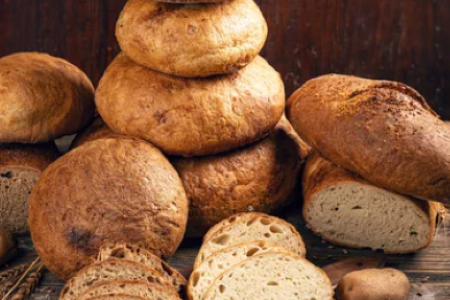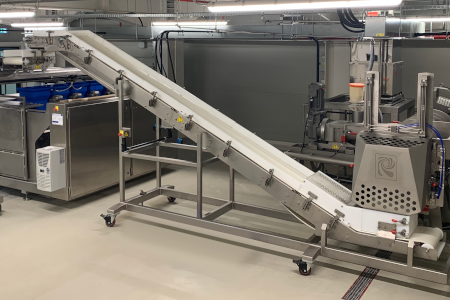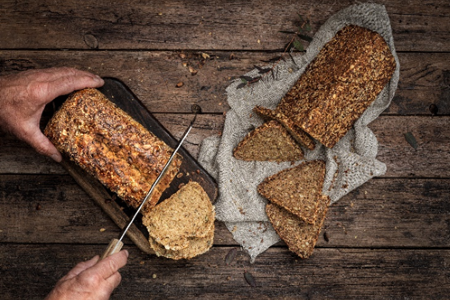Paolo Betto, Sales Area Manager – GEA Bakery, sits down with International Bakery to highlight the benefits and flexibility of hybrid oven baking technology
GEA Bakery introduced the concept of hybrid baking technology in the early 1980s; this turning point came after the practical observation that different heat treatments are required for dough pieces in different parts of their baking process; since then, crackers are baked on hybrid ovens constituted by DGF (Direct Gas Fired) + Indirect Convection; while Rotary Moulded & Wirecut/Deposited products are better baked on Radiated Heated+Indirect Convection: these two main formats have now become the standard of the sector. International Bakery magazine catches up with Paolo Betto, who tells us more about the GEA Bakery Experience Centre and the benefits to hybrid baking technology.
The GEA Bakery Experience Centre is our modern technology centre to test existing recipes and develop new ones. Our experts can assist customers in finding the best process to fit their production needs. The BEC features two pilot plants, each equipped with hybrid oven technology suitable for baking the above-mentioned category of products; our customers are warmly welcomed to test their current process, or new products, on our hybrid ovens.
The hybrid baking technology offers an extremely flexible tool in the hands of the bakers: in cracker production, as an example, while the DGF section upfront offers ideal heating power technology for removing most of the moisture, the convection at the end, softly continues the extraction of the little amount of moisture still left inside the dough piece, allowing, at the same time, an optimum and fine-tune control on the final colouring of the top surface and final moisture level. The technical challenge is represented by the ideal proportion between DGF and convection: deep experience of baking technology is necessary to make the right choice!
A hybrid oven requires in general less maintenance than a traditional single-heating system one; if we take for example a cracker oven, the hybrid configuration requires approximately 30% less ribbon burners if compared to an old fashion single-heating system oven, with consequent drop of maintenance time, maintenance cost and necessity of spares. Big improvements have been obtained by the adoption of big man-holes apertures on the non-control side of the baking chamber; this feature enormously facilitates accessibility to the baking chamber for cleaning or inspection purposes. Its pre-assembled module construction generally allows a shorter installation time with consequent reduction downtime and man-labour requirements.
In a hybrid oven, the heat transfer is optimised in respect of the possible need of the dough piece under baking; at the beginning, the product requires a lot of heat to rise its temperature and start the evaporation of the moisture; at the end of the baking process, this moisture removal is almost completed, and gentle heating is required to fine tune the Maillard reaction which gives the golden colour to the top surface of our cookies or cracker. In short, ideal type of heat and in the right amount is given at different stages of the baking process. The practical effect is that the hybrid oven offers a better and more efficient heat distribution, while being more flexible to operate than a traditional single-heating system oven.
Optimise your space and production
The main “general” topics recurring during the technical conversation with our customers, can be summarised as: higher production rate; longer or wider oven technology in order to optimise the limited space available in their existing bakeries; on this respect we can offer complete lines up to 2m of width, the widest ever built in the market so far. Flexibility: the baker needs to have a very flexible oven to use in a friendly way; fast response to change of setting is a requirement; uniformity of colouring and moisture level is now days given for granted. Higher Flow-rate production and flexibility seem in contradiction; in reality, the technologies we have developed throughout all these years allow the adoption of these two apparent in-conflict concepts. Energy saving technologies is another question which is raised around 30-40% of the time.
Throughout almost 60 years of activity in the sector, GEA has followed a continuous and constant improvement of its oven’s design. Energy saving technologies have been developed and offered as an option to new ovens, optimisation of all the aspect of the baking process, the thickest insulation of the baking chamber, ideal burning capacity of the burner selected are all factors that are considered daily by our oven’s Design Engineers. With the scope of leaving a better and cleaner world to the next generation, GEA is on the verge of presenting the new and improved electric oven: state-of-the-art baking technology accompanied by the cleanest process for our environment. Besides the important performance in terms of environmental sustainability, the electric oven guarantees economic advantages, especially in those markets where electrical power has a more competitive cost if compared to fossil fuels.
There is clear consciousness in the population of the planet, that it is now time to live in a much cleaner world; we perceive that, this clearly marked cultural trend, is understood by the cookie and cracker bakeries throughout the world, who have involved their preferred supplier, like GEA, to contribute to the achievement of this goal. GEA in general, and GEA Bakery in particular, feels the same requirement and has been heavily committed to this target since some years back. We have started to review the design of a whole range of our equipment in order to reduce the energy required in baked product production. For example, our design engineers are trained to select only those components which provide the lowest energy consumption standards, while ensuring the highest safety standards at the same time. In the bakery sector, the equipment which has the highest impact on the environment, is the baking oven; on this field we can offer two options on energy savings when installing a new equipment: in case the oven has to be equipped with traditional fossil fuel consuming burners, the energy saving can be obtained by pre-heating the combustion air of the burner; when a new oven is installed in place of a 30 year-old oven, an energy saving of approximately 30–40% could be expected. This is quite a significant saving in terms of CO2 dispersed in the atmosphere as well as a positive impact to the bakery gas bill at the end of the year. The second option that can be offered to the market by GEA Bakery is the electric oven, this type of oven provides zero impact to the environment when baking its products. This is not a new technology for us, we provided electric ovens since the start of our business, almost 60 years ago, to those countries where electricity was the only source of energy available, or where it was the cheapest fuel. We are now working on a new edition of the electric oven with updated features, which we will present in the upcoming months.
GEA strongly believes in environmental sustainability, as stated in our motto “Engineering for a better world”, GEA believes in providing state-of-the-art technological solutions without making compromising the protection of the environment. The electric oven is a clear combination of these aspects, presenting several advantages that can be experienced when using this technology: lower maintenance costs, friendly-to-operate; smooth baking process and easy installation. Furthermore, some countries have been benefited by “bonus” granted by their government for low emission, fostering our customers to work with renewable energies, such as electricity, in the baking process.
GEA Bakery is constantly engaged in innovation processes – it’s in our DNA! Infrared, more efficient burners, which require less gas than traditional ribbon burners are an area of application, that we can disclose, currently under exploration. In practice, some other projects are under development now that will see their presentation on the market in the near future.
To stay up to date on the latest, trends, innovations, people news and company updates within the global bakery market please register to receive our newsletter here.
Media contact
Roshini Bains
Editor, International Bakery
Tel: +44 (0) 1622 823 922
Email: editor@in-bakery.com







